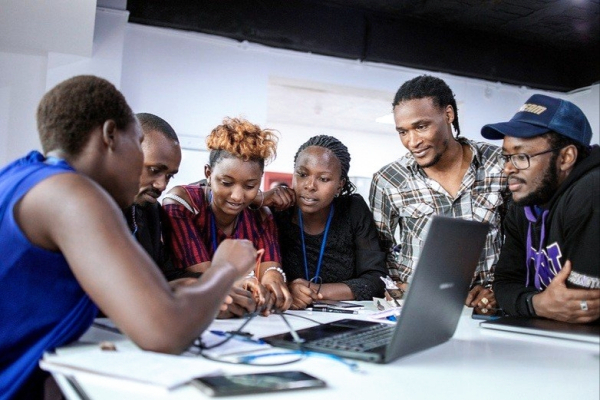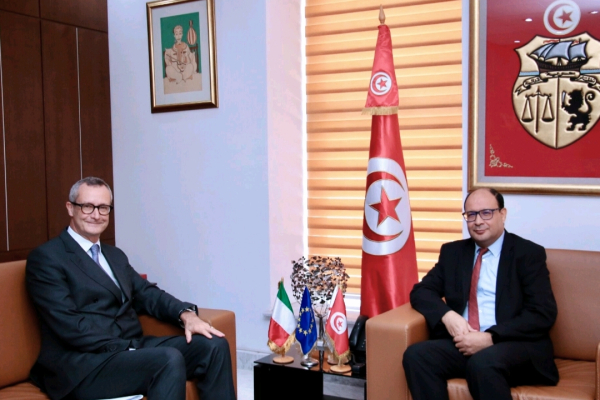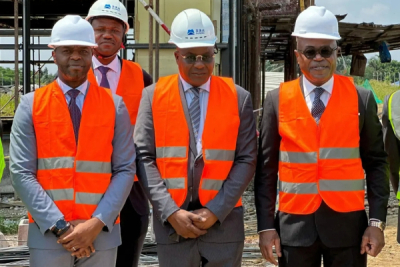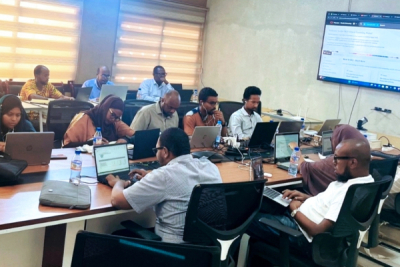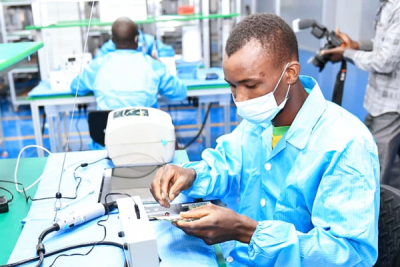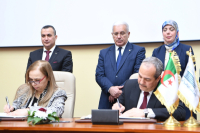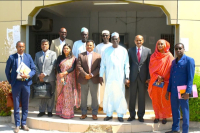
Public Management (481)
Nigerian authorities are leveraging digital technology to enhance public service quality, with a goal of digitizing 75% of those services by 2027.
The Nigerian government plans to streamline citizen access to public digital services with a newly unveiled digital public infrastructure framework. The framework, designed to support citizens throughout their lives, will create a platform ensuring interoperability across all public services.
"[The framework] will also ensure that technology applications in government are designed and operated without silos, while recognizing the responsibilities and mandates of various ministries, departments, and agencies of government across all tiers of government in Nigeria," said Bosun Tijani, Minister of Communications, Innovation, and Digital Economy, in a post on X, formerly Twitter, on Tuesday, March 4. He added that this integrated government approach will leverage private sector capabilities to develop services for the public.
This initiative is expected to accelerate Nigeria's digital transformation. According to the World Bank, digital public infrastructure (DPI), encompassing digital identity, digital payments, and data sharing, serves as an intermediary between physical infrastructure and sectoral applications. The World Bank believes countries with robust DPI can sustain public services, commerce, hospitals, schools, and other activities through online channels.
The framework's development aligns with the government's goal to digitize 75% of public services by 2027. Meanwhile, the United Nations ranked Nigeria 144th out of 193 countries in the 2024 e-Government Development Index (EGDI), with a score of 0.4815 out of 1. While Nigeria's score exceeds the West African average of 0.3957 and the African average of 0.4247, it remains below the global average. In the online services category, Nigeria scored 0.5372.
However, the Nigerian government has not yet specified a timeline for implementing the DPI framework. Its successful implementation will depend significantly on the country's existing digital infrastructure, including internet connectivity, devices, servers, data centers, cloud services, and routers. In the EGDI's "telecommunications infrastructure" component, Nigeria scored 0.4836 out of 1.
By Isaac K. Kassouwi,
Editing by Sèna D. B. de Sodji
In its bid to grow its digital sector, Tunisia, like other African nations, is pursuing international partnerships, recently strengthening ties with India and France.
Tunisia and Italy discussed enhancing their information and communication technology (ICT) cooperation during a meeting on Monday, March 3, between Tunisian Minister of Communication Technologies Sofiene Hemissi (photo, right) and Italian Ambassador to Tunisia Alessandro Prunas (photo, right).
During the discussions, both parties emphasized areas related to promoting innovation, supporting entrepreneurship, and developing startups.
This potential cooperation could bolster the Tunisian government's digital transformation ambitions, a key pillar of its socioeconomic development strategy. In 2024, Tunisia ranked 87th globally in the United Nations' E-Government Development Index (EGDI), with a score of 0.6935 out of 1, surpassing both African and global averages. In cybersecurity, Tunisia was classified in the third category out of five by the International Telecommunication Union (ITU). The country acknowledges the need for further efforts in organizational measures, capacity building, and cooperation.
Italy, meanwhile, is recognized as a leader in cybersecurity. According to the ITU, this reflects a strong commitment to cybersecurity through coordinated and government-led actions. This includes the assessment, establishment, and implementation of generally accepted cybersecurity measures across all five pillars or up to all indicators. Italy also has an EGDI of 0.8355 out of 1, ranking 51st globally.
The discussions are in their early stages. The exact scope of the potential collaboration remains undefined, and no official agreement has been announced. The progress of negotiations will be monitored to provide further insight into the direction and potential implications.
By Isaac K. Kassouwi,
Editing by Sèna D. B. de Sodji
Digital transformation is a key priority for the Congolese government, which intends to bolster the nation's telecommunications infrastructure to support its objectives.
The Republic of Congo's new national data center is expected to be inaugurated next November, according to the government. Construction of the facility, which began in early 2024, is already 80% complete.
Léon Juste Ibombo, Minister of Posts, Telecommunications, and the Digital Economy, announced this on Thursday, Feb. 28, during a site visit. He was accompanied by Solomane Koné, Deputy Director General for Central Africa at the African Development Bank (AfDB), which is financing the project with a $13 million investment.
The specific features and technical details of the data center have not been disclosed to the public. However, it is known that it will be housed in a three-story expandable building with a basement. The facility will include dedicated rooms for servers, monitoring, and supervision, as well as meeting and conference spaces. Separate areas will be reserved for power supply and cooling equipment to ensure the data center operates efficiently.
As the Congolese government seeks to accelerate its digital transformation and make it a pillar of socioeconomic development, the data center’s commissioning could help strengthen the country’s national telecommunications infrastructure. In 2024, the United Nations Department of Economic and Social Affairs (UNDESA) gave Congo a telecommunications infrastructure index score of 0.2776 out of 1, part of the E-Government Development Index (EGDI). The country ranked 166th out of 193 globally, with its score falling below the averages for Central Africa (0.3354), Africa (0.4247), and the world (0.6382).
The facility is also expected to contribute to Congo’s digital sovereignty, according to officials. “All data generated in Congo must be stored somewhere. Currently, this data is stored abroad, which is why many of our domain names end in ‘.fr’ or ‘.com’ instead of ‘.cg.’ From now on, we will be able to host all public data within the data center, as well as data from telecommunications operators, banks, insurance companies, and other private firms that wish to store their information here—including backups of their primary storage sites,” said Michel Ngakala, Coordinator of the Central African Backbone (CAB) project, during the launch of construction in 2024.
By Isaac K. Kassouwi,
Editing by Sèna D. B. de Sodji
Niger is looking to digital transformation as a key driver for its socioeconomic growth. To achieve this, the government is committed to modernizing and strengthening its national telecommunications infrastructure.
Construction of Niger's national data center has reached 13% completion and is on track for completion by September 30. The nine billion CFA Francs (approximately $14.3 million) project, was discussed last week by the Minister of Communication, Posts, and Digital Economy, Sidi Mohamed Raliou, during a televised address reviewing his ministry’s work.
While the minister did not disclose specific details about the facility's capacity and technical features, he confirmed the data center will be Tier 3, based on Uptime Institute standards. This classification ensures multiple power and cooling pathways, minimizing downtime to 1.6 hours per year. The facility will store and secure public data in Niger.
The data center is expected to strengthen Niger's digital infrastructure, a key step in the country's digital transformation efforts.
According to the United Nations Department of Economic and Social Affairs (UNDESA), Niger scores 0.1578 out of 1 on the telecom infrastructure index, a component of the E-Government Development Index (EGDI). Niger's overall EGDI score is 0.2116, ranking 187th out of 193 countries. This is below the averages for West Africa (0.3957), Africa (0.4247), and the global average (0.6382).
In addition to the data center, Niger must expand telecom coverage and increase adoption of digital technologies. The International Telecommunication Union (ITU) estimates 3G and 4G networks cover 24% and 17.5% of the population, respectively, compared to 92% for 2G. DataReportal figures show Niger had 4.69 million internet subscribers at the beginning of 2024, with a penetration rate of 16.9%. Mobile phone penetration was 59.4%.
By Isaac K. Kassouwi,
Editing by Feriol Bewa
To accelerate its digital transformation, the Djiboutian government has been seeking partnerships with key international players, including India, Qatar, the European Union, and the ITU.
Djibouti's Ministry of Digital Economy and Innovation has launched a program to improve the digital skills of government officials, the ministry announced Sunday, February, 23. The program includes cloud infrastructure training in partnership with the Digital Cooperation Organization (DCO), Oracle University, and the National Institute of Public Administration (INAP).
The training covers key areas such as cloud computing, artificial intelligence, cybersecurity, and data management. Participants from various government departments can access the courses through Oracle University’s MyLearn platform. According to the ministry, this initiative is "a key step in equipping government officials with cutting-edge technological tools to improve public services and accelerate digital innovation."
Through this effort, the Djiboutian government aims to provide officials with the expertise needed to support the country’s digital transformation. The World Bank estimates that nearly 230 million jobs in sub-Saharan Africa will require digital skills by 2030. However, Djibouti still lags in digital infrastructure. The United Nations gives the country a score of 0.2800 out of 1 on its telecom infrastructure index—part of the broader e-government development index—placing it below the African (0.4247) and global (0.6382) averages.
This initiative builds on Djibouti’s Digital Foundation Project, launched in 2022 with World Bank funding. The government aims to establish a strong and inclusive digital economy by 2035, leveraging emerging technologies to drive economic growth. The strategy focuses on developing the ICT sector and digital economy to contribute to GDP growth through added value.
Beyond training government officials, there is a broader need for digital skills across the population. According to the GSMA, a lack of digital literacy is one of the main barriers to internet adoption and, by extension, digital services. The International Telecommunication Union (ITU) estimates Djibouti’s internet penetration rate at 65%, compared to 74.4% for mobile telephony.
By Isaac K. Kassouwi,
Editing by Sèna D. B. de Sodji
Horizon Industries officially began operations in Burkina Faso in April 2022. The company is 35% state-owned through the Burkinabè Economic and Social Development Fund FBDES, reflecting the government's stake in the venture.
The Burkinabe government plans to procure IT equipment from local company Horizon Industries to support public administration. Authorities approved the signing of a framework agreement for this purpose during the Council of Ministers meeting on Wednesday, February 19.
The official statement did not specify the type or quantity of equipment to be acquired. However, Horizon Industries specializes in assembling laptops, mobile phones, tablets, and household appliances, suggesting that the deal could involve a range of digital devices.
This initiative aligns with the government's broader digital transformation strategy. Burkina Faso aims to position itself as a leader in integrating ICT into key sectors such as public administration, education, healthcare, commerce, and agriculture. As part of this effort, the government launched the rehabilitation of the National Administration Computer Network (RESINA) in 2024. By August 2023, RESINA was already connecting around 2,800 administrative buildings, with an additional 130 sites announced for integration by December 2024.
Despite these ambitions, Burkina Faso currently ranks 175th out of 193 countries in the United Nations E-Government Development Index (EGDI), with a score of 0.2895 out of 1—below the regional averages for West Africa (0.3957), Africa (0.4247), and the world (0.6382).
For the IT initiative to be effective, civil servants will require digital skills to use the new equipment efficiently. Additionally, since many administrative tasks may depend on internet access, ensuring high-speed connectivity across government offices will be crucial.
By Isaac K. Kassouwi,
Editing by Sèna D. B. de Sodji
Like many African countries, Tunisia is relying on international cooperation to develop its rapidly growing digital sector. It recently strengthened its ties with India.
Tunisia and France discussed potential digital cooperation, including artificial intelligence, during the AI Action Summit held in Paris from February 10-11, according to the Tunisian Ministry of Communication Technologies.
On the sidelines of the summit, Tunisian Minister of Communication Technologies Sofiene Hemissi met with Clara Chappaz (photo, right), France’s Minister Delegate for Artificial Intelligence and Digital Affairs.
“On this occasion, the minister expressed Tunisia’s ambition to actively contribute to the implementation of the orientations and initiatives discussed at the summit, aiming to harness artificial intelligence technologies for the benefit of humanity in a responsible and inclusive manner,” the Tunisian ministry said in a press release.
The potential partnership could support Tunisia’s broader digital transformation strategy, which the government considers a key driver of socio-economic development.
France ranks 34th globally in the United Nations e-Government Development Index, with a score of 0.8744 out of 1, exceeding the global average of 0.6382. Tunisia’s score is 0.6935.
In cybersecurity, France is recognized by the International Telecommunication Union (ITU) as a global leader. Tunisia is categorized in Tier 3 out of 5, indicating potential for improvement, particularly in organizational measures, capacity building, and international cooperation.
Regarding ICT development, the ITU gives France a score of 89.8 out of 100, while Tunisia scores 77.2, ranking 8th in Africa out of 47 countries.
Discussions between the two countries are in preliminary stages. The specific framework for potential collaboration remains undefined, and no official agreement has been signed or announced. The future of negotiations will determine the specific direction and implications of any partnership.
By Isaac K. Kassouwi,
Editing by Sèna D. B. de Sodji
Digital transformation is a key priority for the Algerian government. On February 9, during a Council of Ministers meeting, President Abdelmadjid Tebboune called for measures to speed up the digitization process.
Algeria officially launched electronic signatures and certification on Sunday, January 16, as part of its ongoing digital transformation efforts. The launch ceremony was attended by Sid Ali Zerrouki, Minister of Post and Telecommunications.
According to a statement from the ministry, the Postal and Electronic Communications Regulatory Authority (ARPCE) has been designated as the national electronic certification authority. It will oversee and regulate service providers offering electronic signature and certification services to the public.
"Electronic certification, also known as digital certification or electronic certificates, is a process that ensures the authenticity, integrity, and security of electronically transmitted or stored information. It relies on cryptographic keys (public and private) to secure data and online transactions," the ministry explained on its website. The World Bank defines an electronic signature as "a signature generated by electronic means to authenticate an electronic transaction."
This launch comes about a month after the signing of a framework agreement between the National People’s Assembly (APN) and the Governmental Electronic Certification Authority (AGCE) to integrate electronic certification and signature services. It aligns with Algeria’s ambition to accelerate digital transformation, a pillar of its socioeconomic development strategy. The government aims to build a true information society by expanding the use of ICT across all economic sectors.
The World Bank has emphasized the importance of transitioning to electronic signatures as digital transactions become more prevalent. "The lack of trusted and legally-recognized means of authenticating electronic transactions has forced a continued reliance on in-person handwritten signatures, undermining digitalization efforts by necessitating recourse to in-person interaction to complete a transaction," the institution noted in its report "Electronic Signatures – Enabling Trusted Digital Transformation," published in September 2024.
By Isaac K. Kassouwi,
Editing by Sèna D. B. de Sodji
Chadian authorities are looking to position digital technology as a key driver of the country’s socioeconomic development. To achieve this, N’Djamena is relying on international cooperation.
The Chadian government is exploring a partnership with India to bolster its digital economy. Discussions focused on this potential collaboration took place Friday between Chad’s Minister of Communications, Digital Economy, and Digitalization, Boukar Michel, and India’s Deputy Minister of Foreign Affairs for Central and East Africa, Sevela Naik Mude.
The talks centered on three key areas: training Chadian engineers in artificial intelligence (AI), supporting the National School of Information and Communication Technologies (ENASTIC) with specialized training for students and faculty, and accelerating the digitization of postal services, including a proposed postal bank.
Chadian officials see India as a global leader in digital technology. India ranks 97th out of 193 countries on the UN’s e-Government Development Index (EGDI), with a score of 0.6678 out of 1, surpassing the global average of 0.6382. The International Telecommunication Union (ITU) also recognizes India for its cybersecurity expertise.
Chad hopes to leverage India’s experience to make digital technology a driver of socioeconomic development. In December 2024, the government launched the $122.3 million (76.45 billion CFA francs) World Bank-funded Digital Transformation Support Project (PATN). Chad’s current EGDI score of 0.1785 lags behind the Central African regional average (0.3354), the African continent (0.4247), and the global benchmark. The country’s cybersecurity classification is Tier 4 out of five.
Discussions between Chad and India are in their early stages, and no firm commitments have been made. However, both sides expressed interest in formalizing the partnership through a memorandum of understanding. No timeline has been announced.
By Isaac K. Kassouwi,
Editing by Sèna D. B. de Sodji
The rise of social media and the internet has intensified the spread of harmful and misleading content. This surge in disinformation poses a threat to social stability, especially in Africa, where it can create confusion and exacerbate tensions.
Francophone Africa now has a dedicated mobile application to combat disinformation. Launched on Thursday, February 6, by Tama Média, La Voix de Mopti, and Sétanal Média, with support from Organisation Internationale de la Francophonie (OIF), the AKILI app aims to bolster fact-checking in a region increasingly saturated with misleading content.
“AKILI relies on a unique combination of cutting-edge technology, artificial intelligence, and human intervention to provide a solution tailored to the region's complex challenges,” the project’s initiators explained. “By leveraging advanced algorithms, AKILI analyzes and verifies information from reliable sources while allowing users to seek expert input from specialized journalists for more complex cases. This hybrid approach ensures a high level of accuracy and credibility.”
The launch is part of the Jumelages entre initiatives francophones de lutte contre les désordres de l'information" (Collaborations between Francophone initiatives combating information disorders) program, which selected the three media partners as 2024 laureates. Designed with an intuitive and engaging interface, the app is accessible to all. It also promotes digital literacy by educating users on the mechanics of disinformation and fostering critical thinking—an essential skill given the growing spread of false information.
AKILI offers several key features: users can verify the authenticity of an article by pasting its link into the chatbot; query the AKILI chatbot via text, video, or voice note; submit fact-checking requests to specialized journalists when a claim cannot be automatically verified; and access educational content, including podcasts and fact-checking videos. These resources are available in French and African languages such as Fulfuldé, Bambara, Wolof, Lingala, and Swahili.
In an African context where disinformation can have significant consequences for social stability and community cohesion, AKILI positions itself as an essential tool. By improving access to reliable information, the app aims to strengthen public trust in the media and contribute to both social stability and sustainable development across African societies.
By Samira Njoya,
Editing by Sèna D. B. de Sodji
More...
Nigeria is leveraging digital technology to enhance public services. To achieve this, the government is actively pursuing international partnerships.
Nigeria is exploring a partnership with Ukraine to digitize its public services. The topic was discussed during a meeting last week between Kashifu Inuwa Abdullahi (photo, center), Director General of the National Information Technology Development Agency (NITDA), and Ivan Kholostenko, Ukraine’s ambassador to Nigeria.
"The discussions centered on exchanging knowledge and exploring advanced digital solutions by leveraging technology to streamline public services, enhance transparency, and improve governance efficiency," NITDA stated in a social media release.
This initiative is part of Nigeria’s digital transformation strategy, which aims to digitize 75% of public services by 2027. As of now, the One Gov platform (Services - 1gov.ng) provides access to 271 digital public services, according to the GSMA. Meanwhile, the Data.gov.ng portal makes non-sensitive government datasets publicly available, promoting transparency and inclusion. The government is also rolling out an Electronic Document Management System (EDMS) to digitize all administrative records.
Currently, Nigeria ranks 144th out of 193 countries in the United Nations E-Government Development Index, with a score of 0.4815 out of 1. While this places the country above the averages for West Africa and Africa, it remains below the global average. In the Online Services sub-index, Nigeria scores 0.5372 out of 1.
In contrast, Ukraine ranks 30th globally in e-government development, with a score of 0.8841, surpassing the averages for the world, Eastern Europe (0.8127), and Europe as a whole (0.8493). The country relies heavily on its Diia app, which the Ukrainian delegation presented to NITDA. This digital platform centralizes government services, databases, and state registries within a unified ecosystem.
While Ukraine has the expertise to support Nigeria, the partnership remains at the discussion stage, with no agreement signed or announced. Additionally, digital service adoption in Nigeria faces obstacles, including limited Internet access. According to the GSMA, 120 million Nigerians still lack access to mobile Internet.
Isaac K. Kassouwi
Digital transformation is a crucial step in improving government efficiency, reducing bureaucracy, and fostering economic growth. Digitalization of public services is essential for enhancing transparency, reducing processing times, and improving accessibility for citizens and businesses.
On February 7, President Wavel Ramkalawan of Seychelles visited the Registrar General’s Office. The visit reaffirmed his administration’s commitment to digitalizing public services.
During the visit, he toured key departments, including Business Registration and Intellectual Property, which play vital roles in business development and innovation protection. He also engaged with senior management to discuss institutional achievements, ongoing challenges, and modernization efforts aimed at improving service efficiency.
Addressing the media alongside Registrar General Wendy Pierre, President Ramkalawan praised the office’s progress in digitalization, emphasizing its role in enhancing service accessibility. He also announced upcoming legislative reforms to support the transition to modernized operations.
The Registrar General’s Office remains focused on creating a transparent, efficient, and technology-driven framework to support Seychelles' development, with digital services set to improve accessibility and efficiency for all citizens.
Globally, digital transformation in government has proven to increase efficiency and reduce corruption. The 2024 UN E-Government Development Index (EGDI), which evaluates e-government readiness and e-participation across UN Member States, ranks Seychelles 92nd out of 193 countries with a score of 0.6773 (out of 1). This reflects its progress in adopting digital services. However, further modernization efforts are necessary to maintain this lead.
Hikmatu Bilali
Algeria is stepping up its efforts to protect citizens online, particularly children, as internet and digital technology use grows. This increased focus aims to address the rising online risks faced by an increasingly connected population.
Sid Ali Zerrouki (photo, left), Algeria’s Minister of Post and Telecommunications, launched a national awareness campaign on Saturday, February 8, aimed at protecting children from the dangers of unsafe internet use. The initiative focuses on risks related to online gaming, web browsing, and social media and will run until February 14.
“This civic initiative aims to raise awareness among children, parents, and educators about best practices for safe internet browsing. It also seeks to inform them about ways to detect and avoid hidden cyber threats, while providing advice, recommendations, and best practices for the responsible use of digital tools,” the Ministry of Post and Telecommunications said in a release.
According to Minister Zerrouki, the program addresses the growing risks of the digital world, which require a preventive and proactive approach to protect citizens, particularly vulnerable groups such as children. The United Nations Children's Fund (UNICEF) estimates that more than one-third of young people in 30 countries worldwide have experienced cyberbullying, and one in five has missed school because of it. The organization also warns of other dangers, including hate speech, violent content, targeted marketing, screen addiction, and online exploitation and abuse.
The initiative aims to create a safe digital environment where children can fully benefit from being online. “Growing up online offers unlimited opportunities. Through computers, smartphones, gaming consoles, and televisions, children learn, imagine, and develop their social networks. When used wisely and made accessible to all, the internet has the potential to broaden horizons and spark creativity worldwide,” UNICEF explains.
Official statistics show internet subscriptions in Algeria grew from 39.8 million in the second quarter of 2019 to 54.9 million in the same period of 2024. While the number of children with internet access is unspecified, 35.2% of Algeria’s 45.95 million inhabitants (as recorded by DataReportal in early 2024) are aged 0 to 17. UNICEF also reports that a child goes online for the first time every half-second globally.
By Isaac K. Kassouwi
Editing by Sèna D. B. de Sodji
Many African countries are making digital transformation a cornerstone of their socioeconomic development strategies. To achieve their ambitions, they are increasingly relying on regional and international partnerships.
Togo and Côte d'Ivoire are looking to strengthen their collaboration on digital transformation. The topic was discussed during a meeting Thursday between Togo’s Minister of Digital Transition and Digitalization, Cina Lawson, and her Ivorian counterpart, Kalil Konaté, who was on a working visit to Lomé.
The discussions covered key areas such as electronic communications regulation, digital innovation, infrastructure improvement, cybersecurity, digital resilience, and the protection of critical digital infrastructure.
The meeting reflects both countries’ ambitions for digital transformation. Togo’s “Togo Digital Strategy” aims to establish the country as a leading digital hub while improving citizens' quality of life through digital services. Ivory Coast’s digital agenda centers on boosting national economic growth by expanding digital services and making everyday life easier.
A joint study by the International Finance Corporation (IFC) and Google projects Africa’s digital economy will reach at least $712 billion by 2050, representing 8.5% of the continent’s GDP. The World Bank estimates Ivory Coast's digital economy could generate over $20 billion by 2050, contingent on increased public and private investment in five key pillars of digital development.
Currently, Togo lags in digital governance. The 2024 UN E-Government Development Index gave Togo a score of 0.3920 out of 1, below the West African average (0.3957), the African average (0.4247), and the global average (0.6382). Ivory Coast, ranked 124th globally with a score of 0.5587, performs better than regional averages but remains below the global benchmark.
In cybersecurity, the International Telecommunication Union (ITU) ranked Togo and Ivory Coast in Tiers 2 and 3, respectively, in its 2024 Global Security Index, highlighting the need for improved digital security measures in both countries.
By Isaac K. Kassouwi,
Editing by Sèna D. B. de Sodji


